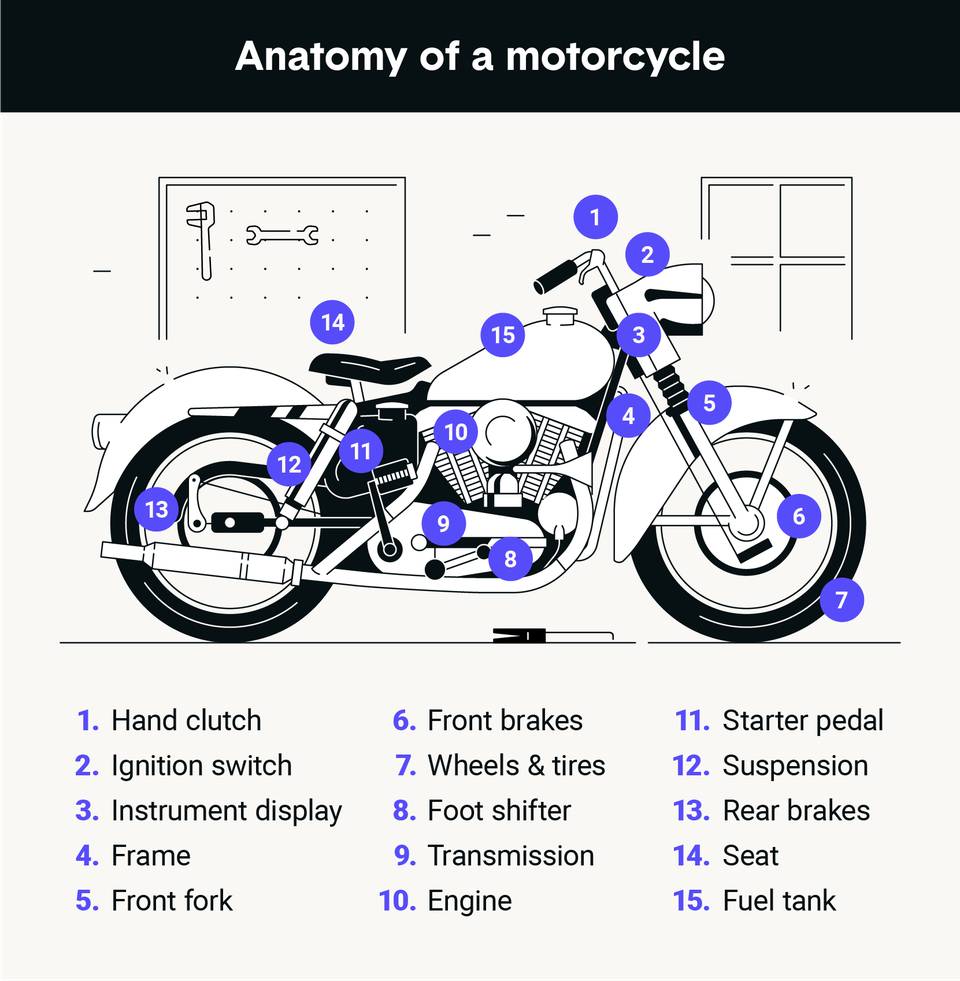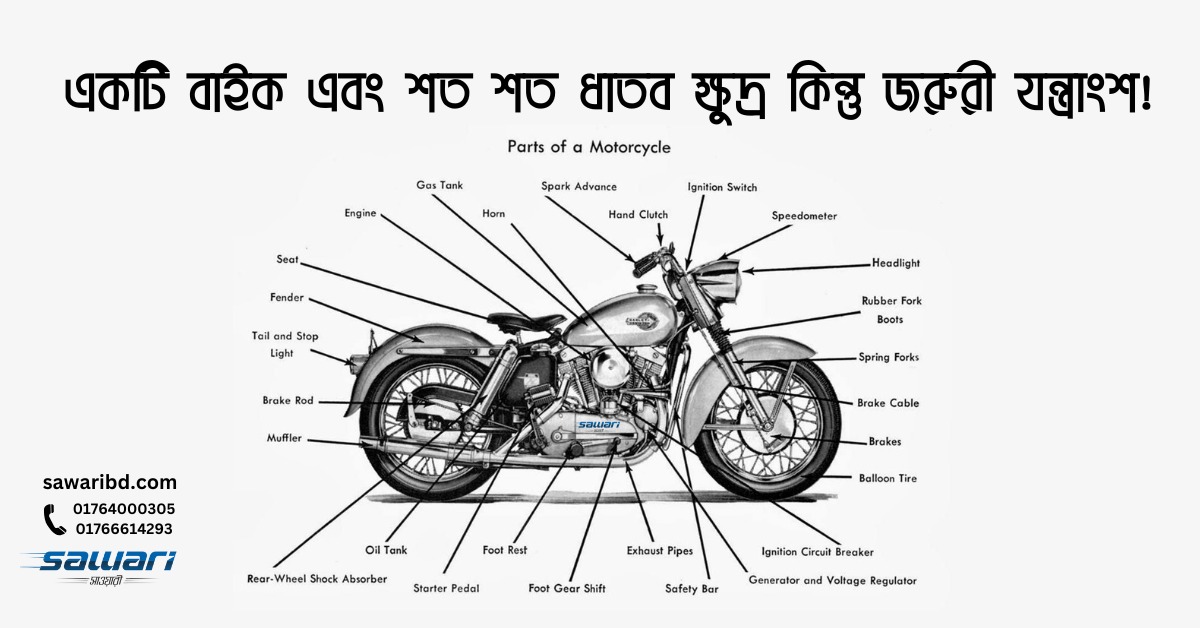Discover the Crucial Motorcycle Parts You Required for Optimum Performance
Recognizing the important components of a motorcycle is basic for achieving peak performance. Each component, from the engine to the stopping system, plays a critical role in overall capability and safety. Routine maintenance can stop unexpected failures and improve the riding experience. Numerous motorcyclists overlook the intricacies of these systems. Discovering how they interact can lead to a more reliable trip. What vital parts should every cyclist focus on?
The Engine: The Heart of Your Bike
The engine acts as the core component of a motorcycle, driving its performance and specifying its capacities. It is in charge of transforming gas into power, which powers the bike onward. Various sorts of engines are used, consisting of single-cylinder, V-twin, and inline setups, each offering unique attributes matched for various riding purposes and designs. The engine size, commonly gauged in cubic centimeters (cc), substantially affects performance, with larger engines typically providing more power and torque.Furthermore, the engine's style and innovation, such as gas shot systems or air-cooling versus liquid-cooling, influence efficiency and integrity. Upkeep is necessary for peak operation; aspects like normal oil modifications and checking ignition system assurance longevity. Riders usually take into consideration an engine's responsiveness and level of smoothness, as these attributes boost the overall riding experience. Inevitably, the engine stays a crucial component that defines not just the motorcycle's performance however also the cyclist's connection to the machine.
The Transmission: Moving Gears Smoothly
The transmission plays an important function in a motorbike's performance, especially in the technicians of gear shifting. Recognizing exactly how to change gears efficiently can enhance the general riding experience, while normal upkeep warranties peak performance. Correct focus to these aspects can substantially influence the long life and effectiveness of the bike.

Gear Shifting Mechanics
Smooth equipment changing is vital for excellent motorcycle performance, significantly influencing both acceleration and control. The technicians of gear shifting include the communication between the clutch, equipment bar, and transmission system. When a motorcyclist involves the clutch, it disengages the engine from the transmission, allowing for an equipment modification without harming the parts. A well-timed release of the clutch, incorporated with exact motion of the equipment bar, facilitates a seamless adjustment between gears. This procedure guarantees that the engine runs within its best power band, enhancing performance. Motorcycle Spares Christchurch. Furthermore, recognizing the equipment ratios and their impact on speed and torque can help cyclists make informed options throughout changes, eventually adding to a more responsive and pleasurable riding experience
Upkeep Tips Importance
Routine maintenance plays an essential role in guaranteeing that the transmission system operates successfully, permitting smooth equipment changes. Frequently altering the transmission and checking fluid is vital, as old liquid can lead to enhanced friction and wear. In addition, evaluating the clutch for wear warranties peak involvement and disengagement, protecting against slippage during equipment modifications. Lubrication of relocating components is just as essential to decrease rubbing and improve efficiency. Motorcycle owners must likewise keep track of for leaks and uncommon noises, as these can suggest underlying problems. By sticking to these maintenance tips, riders can extend the life expectancy of their transmission system, guaranteeing that equipment shifts continue to be smooth and adding to the total performance of their motorcycle.
The Braking System: Ensuring Safety on Every Ride
Braking systems are basic elements that directly affect a motorbike's safety and efficiency. They include different parts, consisting of brake pads, rotors, calipers, and hydraulic lines, all collaborating to assure reliable deceleration. The type of braking system-- typically either disc or drum-- impacts responsiveness and stopping power.Regular maintenance is essential to promote peak performance; worn brake pads can result in decreased efficiency and increased stopping distances. Furthermore, the top quality of brake liquid should be kept track of, as it can take in dampness in time, endangering braking efficiency.Riders need to also take into consideration the relevance of anti-lock braking systems (ABS), which prevent wheel lockup throughout abrupt quits, boosting total security. Effectively operating brakes are not nearly quiting; they instill self-confidence in the rider, enabling safer navigating with numerous surfaces. Ultimately, a trustworthy stopping system is essential for enjoying every adventure with assurance.
The Suspension: Enhancing Convenience and Control
A well-functioning suspension system greatly contributes to a motorcycle's total performance, matching the performance of the stopping system. The suspension plays a considerable function in soaking up shocks from irregular surface areas, assuring a smoother ride while preserving tire contact with the road. This contact is necessary for both security and control, enabling riders to browse corners with self-confidence and precision.Different types of suspension systems, such as telescopic forks or mono-shocks, offer differing levels of convenience and handling. Properly tuned suspension boosts responsiveness, offering the rider with a more linked feeling to the motorcycle. Regular maintenance checks are essential to determine the suspension parts, consisting of dampers and springs, are working at their finest. An efficient shock absorber not only raises the riding experience however likewise contributes to the durability of other motorbike parts by decreasing wear and tear. Therefore, purchasing top quality suspension is crucial for any major motorbike enthusiast.
The Tires: Attaching You to the Road
Tires play an important role in a motorbike's efficiency, working as the key link in between the Check Out Your URL biker and the roadway. Comprehending the different kinds of tires offered can greatly influence dealing with and security. Additionally, regular maintenance is crucial to guarantee peak tire performance and long life.
Tire Enters Explained
Exactly how do various tire types influence a motorbike's efficiency? Tire kinds play an essential function in identifying a motorbike's hold, stability, and handling. Sport tires, created for high efficiency, offer improved traction and responsiveness on smooth roadways, making them optimal for racing and hostile riding. Alternatively, touring tires prioritize toughness and comfort, giving a smoother experience for long-distance travel. Off-road tires, characterized by their tough step patterns, excel in traction on unpaved surfaces, ideal for journey fanatics. Furthermore, dual-sport tires blend features from both off-road and on-road groups, satisfying functional riding needs. Ultimately, selecting the appropriate tire type is vital for enhancing efficiency, making sure safety and security, and boosting the total riding experience.
Maintenance Tips Offered
While riding when driving, maintaining perfect tire condition is vital for safety and security and performance. Routinely checking tire stress is very important, as under-inflated tires can bring about bad handling and raised wear. It is advisable to inspect step deepness regularly; used tires concession hold and security. Additionally, riders should try to find signs of damage, such as lumps or fractures, which can show the need for substitute. Rotating tires regularly ensures even use, improving longevity. Furthermore, maintaining tires tidy from debris and avoiding extreme aesthetics can lengthen their lifespan. Lastly, keeping correct positioning and balance adds to come to a head efficiency, lessening stress on various other bike elements. Sticking to these maintenance pointers will considerably enhance the general riding experience.
The Fuel System: Sustaining Efficiency and Efficiency
The gas system plays a vital role in making best use of a motorcycle's performance and performance, as it guarantees the ideal delivery of fuel to the engine. It consists of numerous essential parts, including the fuel tank, gas pump, gas filter, and fuel injectors or carburetor. Each part has to function properly to guarantee a powerful and smooth ride.The fuel storage tank shops gasoline and provides it to the engine using the fuel pump, which generates the needed pressure. A fuel filter prevents pollutants from going into the engine, while the injectors or carburetor mix fuel with air for combustion.Proper upkeep of the gas system is vital; a clogged up filter or malfunctioning injector can result in reduced efficiency and increased gas usage. By confirming that the gas system runs successfully, bikers can appreciate enhanced throttle response, better fuel economy, and generally enhanced riding experience.
The Electric System: Powering Your Trip
An great post to read efficient electrical system is necessary for the total capability and safety and security of a motorbike, as it powers vital elements such as the ignition, lights, and different electronic systems. This system includes the battery, which stores power, and the generator, accountable for generating power while the engine runs. The electrical wiring harness connects these parts, making certain trusted power distribution.Additionally, integrates shield the system from overloads, while relays assist control high-current devices with low-power signals. A well-maintained electric system improves performance by ensuring smooth beginnings and constant procedure of signals and lights, important for cyclist presence and safety.Regular checks of the battery's cost and connections are essential for protecting against electric failures. Motorcyclists must also evaluate wiring for wear and tear, guaranteeing all components work preferably. Eventually, a durable electrical system adds significantly discover this info here to the overall efficiency and integrity of the motorbike.
Regularly Asked Concerns
Just how Typically Should I Replace My Motorcycle's Battery?
The regularity of bike battery replacement depends on usage and maintenance (Motorcycle Spares Christchurch). Normally, batteries ought to be changed every 3 to five years. Routine checks can aid identify when a replacement is needed for peak performance
What Tools Do I Required for Standard Motorcycle Upkeep?
For standard motorcycle maintenance, one requires important devices such as an outlet collection, wrenches, screwdrivers, pliers, tire pressure gauge, and a torque wrench. These tools help with effective upkeep and guarantee the bike runs effectively and securely.
How Can I Enhance My Motorbike's The rules of aerodynamics?
To boost bike aerodynamics, one need to consider adjusting fairings, using windshield extensions, optimizing body position, and decreasing overall weight. These adjustments assist lessen drag, improving security and gas effectiveness throughout adventures.
What Are the Signs of a Failing Electrical System?
Signs of a failing electric system consist of lowering lights, problem starting, irregular instrument analyses, and blown merges. Motorcycle Parts Auckland. Uncommon smells or corrosion around battery terminals might also indicate underlying concerns requiring immediate focus for safety and security and efficiency

How Do I Select the Right Oil for My Bike?
When picking oil for a bike, one ought to take into consideration the maker's requirements, thickness rankings, and the sort of riding. Additionally, conventional versus synthetic oil can impact performance and engine security, influencing the decision greatly. The engine dimension, normally measured in cubic centimeters (cc), substantially affects performance, with larger engines typically offering more power and torque.Furthermore, the engine's style and modern technology, such as fuel injection systems or air-cooling versus liquid-cooling, influence effectiveness and dependability. A well-functioning suspension system considerably adds to a motorbike's total performance, complementing the efficiency of the stopping system. The gas system plays a crucial duty in optimizing a motorcycle's performance and efficiency, as it guarantees the optimal shipment of fuel to the engine. A gas filter protects against pollutants from going into the engine, while the injectors or carburetor mix gas with air for combustion.Proper maintenance of the gas system is important; a blocked filter or malfunctioning injector can lead to lowered performance and increased gas usage. A well-maintained electrical system enhances efficiency by ensuring smooth beginnings and regular procedure of signals and lights, vital for biker visibility and safety.Regular checks of the battery's charge and links are crucial for stopping electric failings.